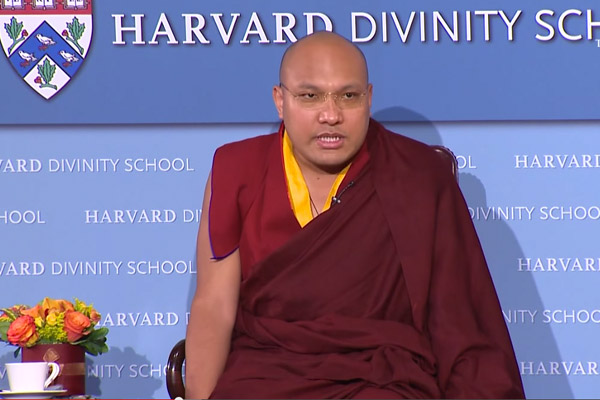
17th Karmapa Talks Love and Apathy at Harvard University
- By Hayli Harding --
- 01 Apr 2015 --

Buddhist leader 17th Gyalwang Karmapa Ogyen T. Dorje visited the Harvard Divinity School where he discussed the value of love and the problems with apathy.
Harvard Divinity School at Harvard University was eager to host the 17th Gyalwang Karmapa Ogyen T. Dorje. The Karmapa is the leader of the Tibetan sect of Buddhism and the 900-year Karma Kagyu school for Tibetan Buddhism. Millions of Buddhists are taught in his school.
The 29-year-old was born in Eastern Tibet to a nomad family. He recanted a story from his youth, where he watched his tribe smother an animal for its meat. He was chosen at a young age by the previous Karmapa’s followers, and was put in training. At 14, he escaped to India, where he could remain close to his lineage teachers and the Dalai Lama.
Caring for Life on Earth in the 21st Century
The Karmapa visited Harvard for two days during a two-month trip around the United States to share his lecture, Caring for Life on Earth in the Twenty-First Century. David N. Hempton greeted him, and even presented him with a commemorative bowl. It was embossed with the school seal and dated. The lecture was given through a translator, which the Karmapa joked about saying that his English wasn’t “up to Harvard standards.” His speech focused on the interdependence that every living creature has with everything else.
He spoke of the intensity that children loved with, and their wide capacity to generate and receive it. He encouraged everyone to not lose touch with that ability to love, as so many of us lose that quality as we reach adulthood. He emphasized the importance of compassion, saying it was something we all need to experience. “In a sense, the most dangerous thing in the world is apathy,” he added, saying that we can defend ourselves against warfare, violence and disease, but not the clutches of apathy.
As he stressed the importance of caring for the world around us, he said, “there is so much information available to us nowadays” but no one feels the need to make choices that better the environment. He spent much of his visit with the students of Harvard, sharing stories and talking with them. He raved about the recently opened Buddhist Ministry Initiative, “because it’s not being approached merely as an objective of study or learning or scholarship, but something that can actually be brought to bear on global issues, which means that even though it is connected with Buddhist tradition, in a sense it transcends it or grows beyond the boundaries of mere Buddhist tradition.”
He ended his lecture with an urging to the students: “feel a love that is courageous… the joyous acknowledgement of your interdependence with each and every other living being and with this environment.”



















